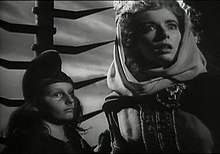Lady Macduff
| Lady Macduff | |
|---|---|

Peggy Webber (right) as Lady Macduff in Orson Welles' film adaptation Macbeth (1948 film)
|
|
| Creator | William Shakespeare |
| Play | Macbeth |
| Date | c.1603-1607 |
| Source | Holinshed's Chronicles |
| Family |
Macduff, husband Son, (name unknown) |
| Role | Macbeth's murder victim |
| Quote | He wants the natural touch, for the poor wren, / The most diminutive of birds, will fight, / Her young ones in the nest, against the owl. (4.2) |
Lady Macduff is a character in William Shakespeare’s Macbeth. She is the wife of Lord Macduff, the Thane of Fife, and the mother of an unnamed son and other children. Her appearance in the play is brief: she and her son are introduced in Act IV Scene II, a climactic scene that ends with her and her son being murdered on Macbeth's orders. Though Lady Macduff’s appearance is limited to this scene, her role in the play is quite significant. Later playwrights, Sir William Davenant especially, expanded her role in adaptation and in performance.
Macduff and Lady Macduff appear in both Raphael Holinshed’s Chronicles (1577) and Hector Boece’s Scotorum Historiæ (1526). Holinshed’s Chronicles was Shakespeare’s main source for Macbeth, though he diverged from the Chronicles significantly by delaying Macduff’s knowledge of his wife’s murder until his arrival in England. The latter part of Act IV Scene III is “wholly of Shakespeare’s invention.”
In Act IV Scene II, Lady Macduff appears alongside the thane of Ross and her unnamed son. She is furious at her husband for his desertion of his family. Ross attempts to comfort her, though he offers little consolation and Lady Macduff responds with sharp retorts that betray her anger toward her husband. Claiming to be overcome with emotion, Ross takes his leave. Lady Macduff is left with her son, whom she speaks with, her fury toward Macduff mingling with her affection for her child. This domesticity is interrupted by the arrival of a messenger who warns her of imminent danger and urges her to escape with her children. Lady Macduff is alarmed and moments later, the scene is invaded by a group of murderers sent by Macbeth. The son is killed first and he urges his mother to flee. She heeds his words and exits the scene screaming, “Murder!”. She is killed off-stage, one of several significant offstage murders in the play.
Lady Macduff’s entire portrait as a character is painted in this one scene, though it is clear through her actions that she is a fiercely protective mother and a woman who is not afraid to speak out against others. She speaks out unabashedly against her husband’s disloyalty, saying “He loves us not” and “His flight was madness.” When one of the murderers asks where her husband is she bravely replies, “I hope in no place so unsanctified / Where such as thou mayst find him.” These interactions with other characters reveal her outspokenness.
...
Wikipedia
